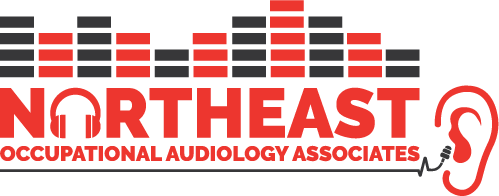- How Do I Know If I Have Hearing Loss?
- What Causes Hearing Loss?
- How Is Hearing Loss Diagnosed?
- What Style Of Hearing Aid Do I Need?
- What Is Tinnitus?
- What Causes Tinnitus?
- How Is Tinnitus Treated?
- Will insurance pay for my hearing aid?
- Do you accept my insurance?
How Do I Know If I Have Hearing Loss?
If you’re concerned you or a loved one may be experiencing hearing loss, you are not alone. Hearing loss is typically progressive. It occurs gradually so initially it may go unnoticed. In fact, it’s often the people around you who notice your hearing problems before you do. If you exhibit the following symptoms, consider visiting the professionals at Northeast Occupational Audiology Associates:
• Speak does not sound clear, distinct, and/or crisp at times
• You play the TV or radio louder than your friends, spouse or relatives
• You have to focus or you miss parts of conversation
• You must ask people to repeat what they said
• You laugh at jokes even though you may not have heard the details
• You need to ask others about the details of a meeting you just attended
• You play the TV or radio louder than your friends, spouse or relatives
• You cannot hear the doorbell or the telephone
• You find that looking at people when they speak to you makes it easier to understand
• You miss environmental sounds, such as birds chirping or leaves blowing
• You find yourself avoiding certain restaurants because they are too noisy
• You hear a ringing sound in your ears, especially when it is quiet.
What Causes Hearing Loss?
Hearing loss can be due to several factors such as the exposure to loud noise, aging, medications, infections, head or ear trauma, congenital (birth) or genetic factors, diseases, as well as a number of other causes.
How Is Hearing Loss Diagnosed?
If you exhibit symptoms of hearing loss, you should visit the audiologists at Northeast Occupational Audiology Associates to have a formal hearing evaluation. Your appointment will include a thorough case history and a visual inspection of the ear canal and eardrum. Middle ear function testing may be performed and the results of the evaluation can be useful to a physician, if the audiologist believes your hearing loss may benefit from medical intervention
The hearing evaluation will consist of pure tone and speech testing. Results of the hearing evaluation are plotted on a graph called an audiogram. The audiogram provides a visual view of your hearing test results across various pitches or frequencies, especially the ones necessary for understanding speech. The audiogram and results from your speech understanding tests are used to create a prescription by which hearing aids are chosen and programmed.
Over the Counter Hearing Aids: An over-the-counter hearing aid does not require a hearing test or for you to see an audiologist. It is purchased at the front desk.
What Style Of Hearing Aid Do I Need?
There are many types of hearing aids today and the style or device depends on your lifestyle, budget and hearing loss needs. There are in-the-ear styles as well as behind-the-ear styles. In addition to selecting the right style of device, it’s also important to consider what features would be most beneficial to you. From directional microphones to waterproof options, there are numerous varieties to meet everyone’s personal needs. Today’s hearing aids are even equipped with Bluetooth connectivity to work with wireless technology like a cell phone or television. Lastly, do you want a rechargeable hearing aid?
When selecting a style of hearing aid, the following should be considered:
- The type/degree of the hearing loss
- Power requirements
- Manual dexterity and visual abilities
- Budget
- Cosmetics and aesthetics
- Anatomical and medical considerations
- Lifestyle requirements
What Is Tinnitus?
Tinnitus is a common disorder affecting over 50 million people in the United States. It is often referred to as “ringing in the ears,” although some people hear hissing, roaring, whistling, buzzing or clicking. Tinnitus is not actually a disease, but a symptom of another underlying condition of the ear, auditory nerve or other influencing factor. Tinnitus can be intermittent or constant, with single or multiple tones. The perceived volume can range from very soft to extremely loud and may be recurrent or constant.
What Causes Tinnitus?
The exact cause of tinnitus is not known in every case. However, there are several likely factors that may worsen tinnitus. These include:
- Noise-induced hearing loss
- Wax build-up in the ear canal
- Certain medications
- Ear or sinus infections
- Age-related hearing loss
- Ear diseases and disorders
- Jaw misalignment
- Cardiovascular disease
- Certain types of tumors
- Thyroid disorders
- Head and neck trauma
How Is Tinnitus Treated?
Depending on the severity and underlying condition causing the tinnitus, there are several treatments available to improve the perception of unwanted noise. The most common treatments for tinnitus include:
- Hearing aids with tinnitus-masking features
- Tinnitus retraining therapy
- Sound therapy
- Avoidance measures
- Avoidance of certain medications
- Behavioral therapy
Will insurance pay for my hearing aid?
Many health insurance policies cover a variety of hearing aids. It is important to understand your coverage as there are often specific requirements on the type of appliance that is covered and/or limitations on the amount of coverage. It is our goal to find the type of hearing aid that is most suitable to your hearing loss and we will help you understand your treatment options as they relate to your health insurance coverage.
Do you accept my insurance?
We are frequently adding new insurance contracts. Call our office to confirm that we accept your insurance.
Do you offer financing for hearing aids?
We have partnered with CareCredit (please insert link). We offer financing options that take the stress away from purchasing a hearing aid.
